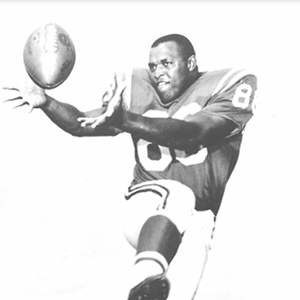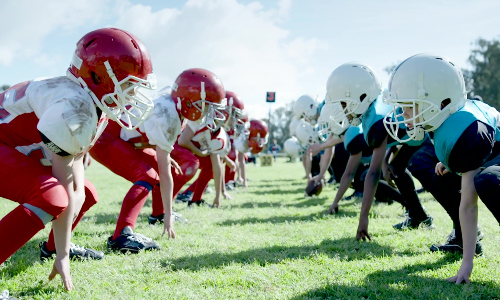Research has shown that the risk of developing Chronic Traumatic Encephalopathy (CTE) correlates with the years of tackle football played. Last week, a bill was re-introduced in the New York state legislature that would ban tackle football for children under the age of 12. If passed, the bill would represent a major step forward in the fight against CTE in football players.
Although the bill was first filed in 2012, there was one major difference when it was reintroduced by Assemblyman Michael Benedetto this year. The bill has been named the John Mackey Youth Football Protection Act after the Pro Football Hall of Fame tight end who was born in Roosevelt, New York and starred at Syracuse University prior to his NFL stardom.

Posted: January 29, 2018
Mackey left an extraordinary legacy both on the field and off, and the John Mackey Youth Football Protection Act continues his fight off the field for the health of football players. On the field, Mackey spent nine of his 10 years in the league playing for the Baltimore Colts. His record setting 75-yard reception from quarterback Johnny Unitas clinched Super Bowl V for the Colts and remains one of the most celebrated catches in Super Bowl history. Off the field, Mackey was the first president of the NFL Players Association, where he fought for better benefits for players. With him in good times and bad was his loving wife Sylvia Mackey.

Sylvia cared for John during his 11-year decline from frontotemporal dementia (FTD), witnessing the progression of John’s symptoms as he gradually lost his memory, executive functioning, and speech until his death in 2011. A post-mortem examination of John’s brain at the VA-BU-CLF Brain Bank revealed that CTE was also responsible for his decline. After more than a decade as John’s caretaker, Sylvia began a tireless fight to carry on her husband’s legacy through the 88 Plan – named for his jersey number—which now provides financial assistance to players affected by neurologically debilitating diseases such as Dementia, Alzheimer’s, ALS, and Parkinson’s disease.
John’s legacy continues to help change the world, most recently through the John Mackey Youth Football Protection Act. Sylvia, a member of the Concussion Legacy Foundation board of directors since 2014, shared with us her thoughts on the bill.
What was your reaction when you heard they wanted to name the bill after John?
Oh my gosh—it is a tremendous honor. It’s a tremendous honor for our family, especially since John wanted to lead programs for youth football for the NFL. He was already concerned about our youth. At the time it was more about teaching children the game of football, but if he had been around today he would have realized that he also has to protect them from the game of football. I think he’d be all for this bill and for the Flag Football Under 14 campaign. As president of the NFL Players Association he fought for the Mackey Law regarding free agency way before his passing. Now, after his death, he has another law to protect children. That is an honor.
It’s fair to say that by caring for John, you became an expert in the day to day realties of CTE and FTD. How does it feel to hear about this bill and know that people are fighting to prevent what your husband went through from happening to the next generation of athletes?
I know John would have been 100 percent behind this because at one time he was looked at to head up the youth football committee for the National Football League. Of course, he wasn’t able to go very far at the helm because of his disease. At the time that he played before he became ill, he couldn’t foresee all the problems that have turned up. However, I’m certain that if he knew what we know now, he definitely would have wanted to protect the children as much as possible and this football bill is a great start.

Do you see this bill as striking a blow against football?
No, I don’t think this is a blow against the game of football itself. We’re not saying that it should go away. In fact, my seven-year-old grandson is playing flag football and we love the game. John loved the game. The negative things that happen because of football such as CTE do not happen to the majority, but the minority that it does happen to is large enough for us to recognize and respond to. Nobody wants to see the game go away. I certainly don’t. I know there are some people who have turned against it. But we have to protect those who are playing it and make the whole game safer. We’ll never get rid of 100 percent of injuries. We’ll never get rid of 100 percent of CTE, frontotemporal dementia, Alzheimer’s, or other dementias. That’s just life. And some of it will be caused by the game. But we’re trying to lessen the impact.
What do you say to skeptics who argue that age 12 is too late for athletes to develop the skills necessary to play football at a higher level?
Well John didn’t start until he was 14 or 15, he didn’t go out for the team until sophomore year of high school. He’d been a pole vaulter and a basketball player before then. And he made it into the Pro Football Hall of Fame. To get an answer to that question, let’s ask every single hall of famer and every single retiree – when did they start playing? Some probably started at 5 or 6, but there are enough that started at 14 or 15 to support the reality that you can start playing later in life and become an extraordinary player. It’s simply not true that you can’t develop the necessary skills if you start at [age] 12.
Knowing that this bill is a step in the right direction, how optimistic are you that more states will follow suit to get out in front of this issue?
Just by the fact that two great states already have, I’m very optimistic that more states will. I’m not saying that they all will, but I’m optimistic that many more will. Only the future, which will be past our time, will tell by the statistics how effective the bill is. And I’m confident that it will be very effective.

